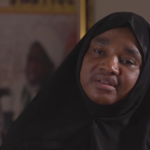Ethiopian-American writer Maaza Mengiste has been shortlisted for the Booker Prize for her book, The Shadow King. She is the second African writer to be shortlisted in the prestigious literary award.
The Shadow King is about an orphan girl named Hirut living in Ethiopia in 1935 amid the threat of invasion by Mussolini.
The Booker Prize is the UK’s most prestigious literary award open to any novel written in English and published in the UK and Ireland.
Ethiopian author and scholar Maaza Mengiste is among six candidates shortlisted for the annual Booker Prize for her book, The Shadow King; a book which took her almost 10 years to complete.
“For me the biggest thing was finishing this book which took a really really long time and there were so many years where I didn’t think I was capable of writing it. So to have it published and then have people read it is wonderful for me.
But to get the call that I was first longlisted, I cannot tell you, it felt like some part of my world exploded open, you know…like things were possible.”
The Booker Prize is the UK’s most prestigious literary award open to any novel written in English and published in the UK and Ireland.
“When I started the book I was really interested in the history of Italian invasion in Ethiopia, of people who rose up and fought against an army that was better equipped than them, and after five years somehow they illogically won.”
“I became really interested in the ways that this colonial enterprise that we are so familiar with around the world, how it used myths, lies and photography to justify their subjugation of millions of people around the world,” Maaza added.
“It became more than a story about this war for me. It became really an investigation on how we live with each other.”
Maaza spent nine years writing this book, three of which were spent in Italy conducting research.
“I was not directly connected to the trauma of that war but something happened in the process of writing this, and in the process of re-imagining part of what I knew the Italians did, it started to weigh on me.
It made this history alive in a way that was all so very heavy but what I wanted to do in the writing was have the reader experience some of that in such a way it became bearable.”
“There’s the war on that side, but I was also writing about sexual abuse, sexual assault and the violences that patriachy enacts on women no matter what side of war or conflict they are on. I was looking at the abuse that happens in the home. The domestic violence that still happens today.
That’s happening everywhere.”
“So in that way, the story became very current to me, and those resistance fighters, the women that I was writing about in the 1930s have always existed and they exist today in 2020. We see them out on the streets, confronting the police, confronting corruption, confronting poor policies. But we don’t talk about them as history.
I have met women who were silent, but that silence has never equaled weakness to me and I wanted to replicate that in the book.”
Maaza Mengiste has always been an activist for human rights and has also always had an interest in ways that the arts can communicate this.
One of the ways she has excelled in this is in the production of a documentary film project called ‘GIRL RISING’ which focuses on girls’ education globally and features the voices of several female Hollywood actresses like Meryl Streep, Anne Hathway and musician Alicia Keys.
As a member of the advisory board for the Young Centre for Immigrant Children’s Rights, she continues to provide assistance and her knowledge to serve unaccompanied and separated immigrant, migrant and refugee children who are in the United States through a variety of programmes.
The winner of the Booker Prize 2020 will be announced on 19 November 2020.














